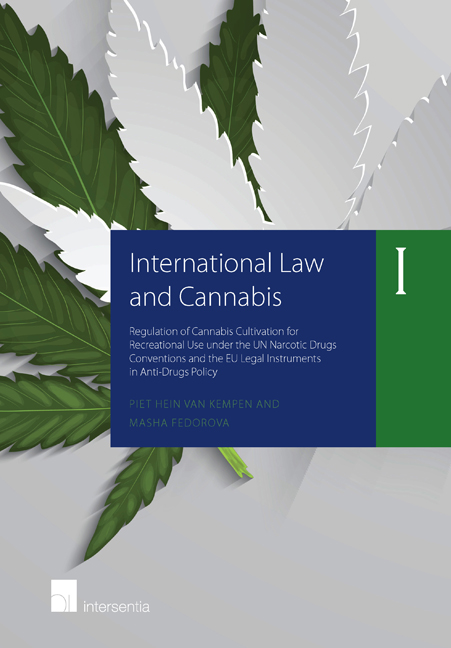 International Law and Cannabis I
International Law and Cannabis I Book contents
- Frontmatter
- Preface
- Contents
- List of Cases
- List of Abbreviations
- Chapter 1 Introduction
- Chapter 2 Obligations under International Law Regarding Cannabis: UN Narcotic Drugs Conventions
- Chapter 3 Obligations under European Law Regarding Cannabis: EU Laws on Drugs
- Chapter 4 Assessment of the Arguments and Initiatives Regarding Regulation of Cannabis Cultivation
- Chapter 5 Conclusion
- Bibliography
- Executive Summary of Volume II
- About the Authors
Chapter 4 - Assessment of the Arguments and Initiatives Regarding Regulation of Cannabis Cultivation
Published online by Cambridge University Press: 09 November 2019
- Frontmatter
- Preface
- Contents
- List of Cases
- List of Abbreviations
- Chapter 1 Introduction
- Chapter 2 Obligations under International Law Regarding Cannabis: UN Narcotic Drugs Conventions
- Chapter 3 Obligations under European Law Regarding Cannabis: EU Laws on Drugs
- Chapter 4 Assessment of the Arguments and Initiatives Regarding Regulation of Cannabis Cultivation
- Chapter 5 Conclusion
- Bibliography
- Executive Summary of Volume II
- About the Authors
Summary
INTRODUCTION
The possibilities for and obstacles to regulated cannabis cultivation intended for recreational use are the fuel for extensive and sometimes fierce debate both in the Netherlands and in several other countries. This chapter contains an inventory and categorization of arguments and initiatives for the regulation of cannabis cultivation in and outside the Netherlands. These arguments and initiatives will be analysed and assessed in the light of the UN narcotic drugs conventions and the EU laws on drugs. This is primarily done on the basis of the explanations in Chapter 2 and Chapter 3, supplemented if necessary by further discourse about international law and EU law.
The following starts with an inventory, categorization and evaluation of the legal arguments presented. It primarily concerns arguments relating to the UN narcotic drugs conventions and the EU laws on drugs. Secondly, all sorts of factual, social and political arguments set forth to legitimize the regulation of cannabis cultivation will be discussed. The last part before the conclusion constitutes an account, categorization and evaluation of modalities proposed in the Netherlands and introduced in other countries for the regulation of cannabis cultivation for recreational purposes. We note that the following inevitably contains many explanations that can already be found in Chapters 2 and 3, in a slightly different context or with a somewhat different wording.
LEGAL ARGUMENTS FOR REGULATING CANNABIS
Legal arguments for the regulation of cannabis for recreational use involve claims of existing legal room under positive law to this end. In addition, there are specific arguments arguing about the existence of discretion under public international law to regulate cannabis cultivation and trade. The following is an overview of these arguments, sorted by topic, and our discussion thereof in the light of the UN narcotic drugs conventions and the EU instruments.
AMENDING THE RELEVANT UN NARCOTIC DRUGS CONVENTIONS
First, arguments are presented that directly put the conventions centre stage in order to answer the question how any room for legal manoeuvring can be found in order to achieve regulation of cannabis cultivation and trade for recreational use. One argument suggests that legalization of cannabis cultivation can be achieved by amending the relevant UN narcotic drugs conventions.
- Type
- Chapter
- Information
- International Law and Cannabis IRegulation of Cannabis Cultivation for Recreational Use under the UN Narcotic Drugs Conventions and the EU Legal Instruments in Anti-Drugs Policy, pp. 139 - 206Publisher: IntersentiaPrint publication year: 2019


